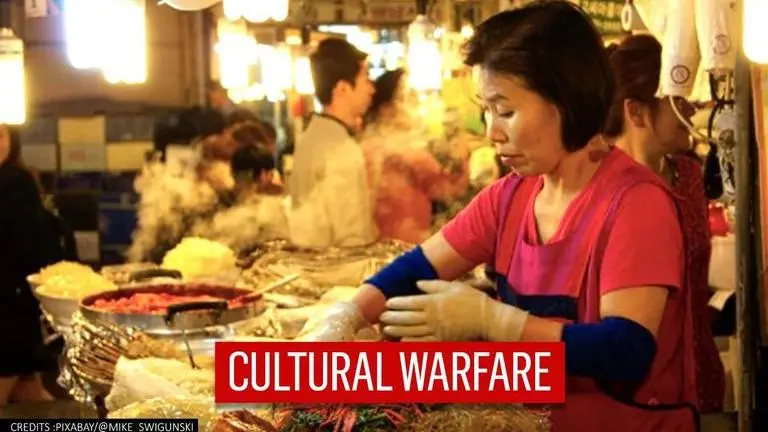Updated 1 December 2020 at 05:42 IST
Kimchi draws cultural battlelines between South Korea and China over ISO certification
South Korea maintains that the traditional dish represented Korean culture and China has nothing to do with it, escalating fresh tensions since the 1996 spat.
- Entertainment News
- 3 min read

After years of heated Kimchi dispute with Japan, South Korea has now officially waged the cultural-cuisine warfare with China about the territory where the world-famous pickled dish originated and which nation can cook it better. The fermented cabbage dish is a central part of Korea's food culture, but recently, China claimed that it had won ISO certification from the International Organisation for Standardization (ISO) for the best process to cook the dish.
Triggered by China’s occupation of the dish’s merits and its food expansionist agenda, the South Korean government jumped in to remind the Ministry of Agriculture, Food and Rural Affairs of China that the 'famed spicy cabbage' and how to cook it properly was, in fact, South Korea’s "internal matter".
Refuting China’s claims, South Korea said that the traditional side dish represented Korean culture and China had nothing to do with it, escalating fresh tensions since the 1996 historic Kimchi dispute. In the year 2000, South Korea had approached Codex Alimentarius of the United Nations Food and Agriculture Organisation with an appeal to formulate the international Kimchi standards to protect the sovereignty of the dish.
Advertisement
South Korea waged a cuisine conflict with Japan for introducing Japanese Kimchi, 'kimuchi' in the Atlanta Olympic food festival. The committee, however, left the issue in the condition of the draft, saying that it will introduce the international standard for Kimchi in July 2001. An informal truce was reached between the two countries over the years. However, from time to time, Japan reiterated that South Korea held no monopoly on the cabbage.
Advertisement
The 'Pao Cai' version
Defending the international certification, China’s ministry clarified on social media that the country’s cabbage dish standards were acknowledged for 'Pao Cai', a separate version of the same cuisine but not exactly the one South Korea identified as its 'national soul food'. The statement triggered a strong response from South Korea, who reminded the Chinese authorities that changing the title of the staple Korean cuisine implied that it was Kimchi ‘made in China’. Shortly afterward, the South Korean civilians clashed with the Chinese on social media, attacking each other for stealing the food.
On the website naver.com, South Koreans called Chinese "burglars" that stole their dish idea, meanwhile Chinese citizens retaliated on Weibo to call out Korean failure to meet the standard of the dish implies a loss of sovereignty on the dish altogether. Some argued that the dish’s name sounded like it originated in China.
Many in the Chinese ranks argued that Kimchi was first cooked in Sichuan. South Koreans, however, defended the rights on the dish saying that the process of cooking Kimchi was called 'kimjang' and that explained its Korean-ness. According to Yonhap News Agency, Koreans urged for a "strong action" against China for robbing their "cultural asset" as the battle of wits and chopsticks tickled social media.
Published By : Zaini Majeed
Published On: 1 December 2020 at 05:42 IST
